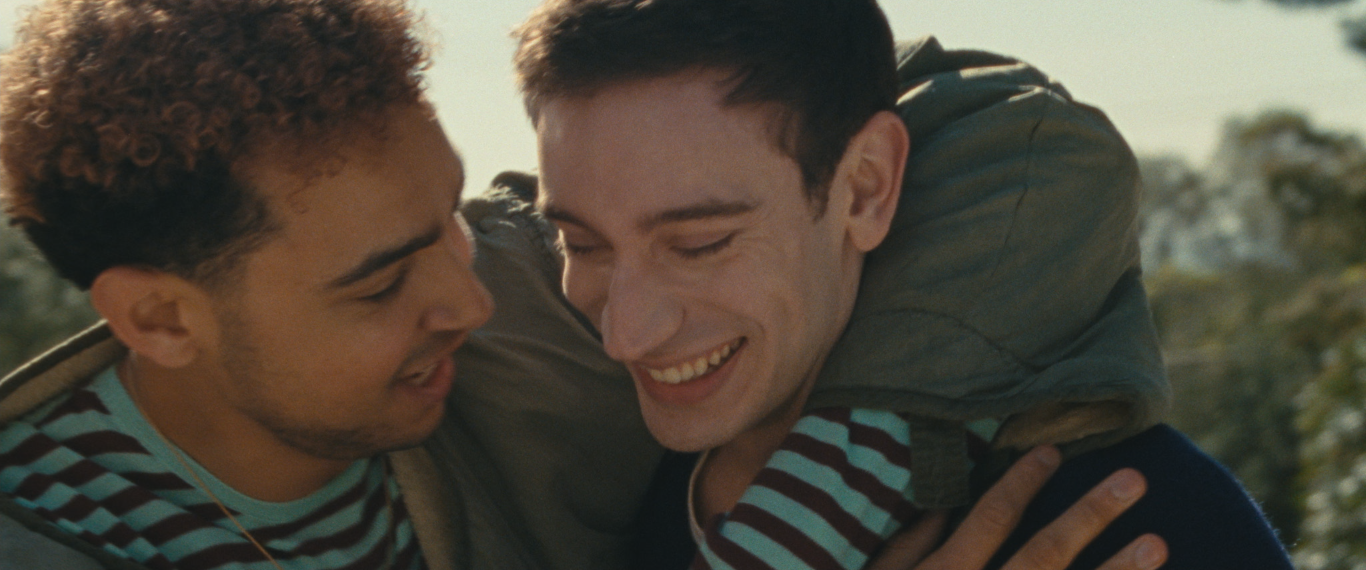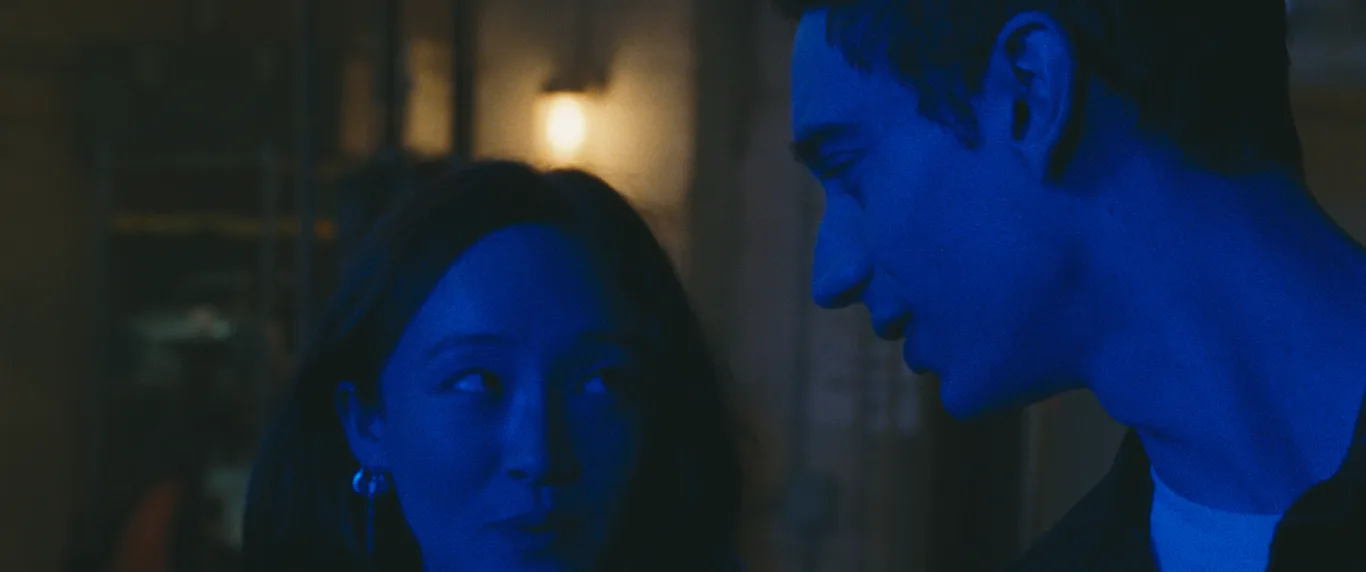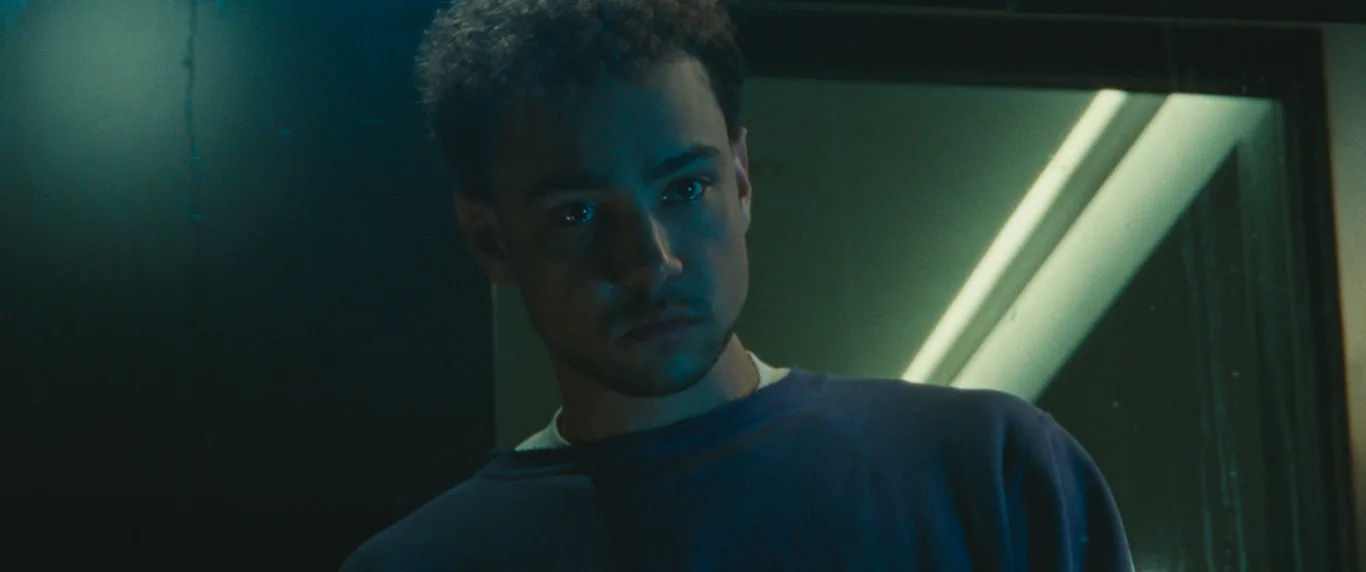
Love, obsession, power, and attention collide to thrilling and frightening effect in Alex Russell’s feature-length directorial debut, “Lurker.”
Set in 2018, with all its accoutrements (TikTok is blissfully absent, characters’ iPhones are using iOS 12, etc.), the film opens with Matthew (a chilling Théodore Pellerin), who takes notice when an up-and-coming pop star, Oliver (Archie Madekwe), enters the clothing store where he works. While store patrons and Matthew’s co-worker, Jamie (Sunny Suljic), vie for a picture or try to give Oliver a compliment, Matthew plays Nile Rodgers’ “My Love Song For You” over the store speakers, which instantly causes Oliver to take notice. He cuts past the growing posse of fans and, impressed by Matthew’s taste in music, invites him to attend his evening show.
Matthew accepts and meets various members of Oliver’s posse (played by the likes of Zach Fox, Havana Rose Liu, Wale Onayemi, and Daniel Zolghadri). Enraptured, Matthew resolves to do anything he can to stay in Oliver’s orbit, hoping that as Oliver rises in stature, success will help give meaning to his own directionless life.
For Russell, the desire to be proximate to power within Oliver’s inner circle is simply a recapitulation of high school dynamics; he wonders if people in society ever break free from that hierarchical way of understanding the world. “But everything, even geopolitically, is just about power, proximity, alliances, and betrayals. That’s just the lens through which I’m seeing it. And it’s all men who are doing this,” he shared.
Over Zoom, RogerEbert.com spoke with Russell about viewing his contemporary tale as a period piece (à la “Uncut Gems” or “The Social Network”), whether celebrity can be redeemed, and how ignorance separates fans from friends.
This conversation has been edited and condensed for clarity. This interview contains spoilers for “Lurker.”
I’ve heard you previously describe “Lurker” as a period piece, particularly how it’s set in a time before the rise of social media like TikTok, where people could go viral at a moment’s notice. The film feels both relevant and endemic to 2018.
Alex Russell: It was an anchor for me. I did set this film in 2018, and whether or not people realize that while watching this isn’t that important. Enough time has passed that that era has sort of crystallized in my mind. With that distance, I’m able to situate for myself what it felt like back then. When you’re in the eye of a storm or are trying to make something modern, there’s pressure to stay in tune with the lingo of the time. I didn’t want to concern myself with those details; I didn’t want to have to use TikTok or address COVID.
You don’t know what your time is like until later. Seven years is, in my opinion, the perfect length of time. Films like “The Social Network” or “Uncut Gems” are seven-year period pieces, and so is this one. Enough time has passed that I can then speak on it. It doesn’t even need to be about that time, but you remember what is important.
I think that if someone watched this right now and weren’t aware of its period nature, they wouldn’t think it feels old. The things people are dealing with are not new or old. This specificity helped set me in the world. If you look closely, no one is wearing AirPod Pros. The iOS is of that time… the characters still have to use an aux cord.
They’re not yet enlightened to the power of Bluetooth. Your film is the latest in a curious series of projects this year, from “Twinless” to “Friendship” that explore the fallout of the male loneliness epidemic. To your point, though, these struggles seem timeless.
It is a trendy conversation, though.
It reminds me of what Zack Fox shared in another interview about how, as we grow older, we often revert to high school dynamics in our relationships.
They just need to be more calculated about it or smarter about how they position themselves or manipulate each other. But everything, even geopolitically, is just about power, proximity, alliances, and betrayals. That’s just the lens through which I’m seeing it. And it’s all men who are doing this.
We witness the downfall in real time of what happens when people are forced to hide behind these tactics. In the context of the film, I found the deployment of “ignorance” fascinating. It is Matthew acting nonchalantly and hiding his affection for Oliver that grants him access to this world. This is what separates the fans from the friends. We don’t reward overt affection, and you get punished for being too “into” something.
Playing dumb is a big part of this movie. The characters are very aware of these interpersonal dynamics, but they’re not speaking about them. You notice their awareness through their looks. Whoever knows in a given moment has the power.
These friend groups and spaces are constructed in a way that naming the hierarchy would be considered shameful and in poor taste. I always mention this clip from “Vanderpump Rules.” I haven’t seen this show, but in this scene, there’s this group of guys who are arguing about something, and one of them says, “Why are you acting like I’m not the number one guy in this group?” or something to that effect. This is something that no one would ever say out loud, but everyone feels. I think if characters in “Lurker” were to be brave enough to admit what’s going on, they’d be met with people who say, “Oh, I wasn’t even looking at things that way at all.” These guys are overt in their dealings with each other, where they can be explicit, but they give up something by voicing it.
Then everything becomes a game of hot potato, with whoever commands the attention and can wield the power changing at a given moment. I think of that scene where Swett teases Matthew for taking his pants off, and in that moment, Matthew has to do something outrageous to get the room to focus on him. Spectacle makes for a great scapegoat.
Yeah, for Matthew, that’s such a Hail Mary.
Much of your film revolves around the disillusionment that comes with proximity… how, when we get to peek behind the curtain, we realize it’s not as special as we thought it would be. I’m curious to know how, as your career has grown and you may have gained more access than was previously granted, your relationship to those spaces and the privilege associated with them has changed.
That is a great question. I think when it comes to Hollywood growing up, all of this was so far-fetched for what I felt was available to me or accessible. I had never met anyone who was involved in Hollywood in any way, so to be doing this now—doing this interview, for example—and to have a movie coming out feels absurd.
You get used to everything so quickly, though. You meet people and they’re either super normal or… (long pause)
I think I still approach things with a sense of happiness, as I’m just really happy to be here. I’m happy to create something I like, and I’m terrified of losing it. Anytime I meet anyone who has directed or written anything, I’m like, “Lord… that’s so cool.” I still hold onto a romantic ideal of Hollywood that I need to explore and examine. Whatever difficulties I go through, they serve as a reminder that I truly love making movies… that I’m lucky to have had the opportunity to make this one, and that I get to keep working. Does that answer the question?
It’s encouraging to hear you’re trying to protect that love and that dream. I’m thinking of that scene where Matthew’s back in the clothing store he’s working at, and when fans of Oliver’s music recognize him as part of the posse, and he responds resentfully. It’s easy to get jaded.
It’s a weird mix of “don’t meet your heroes” and “do meet your heroes,” and also remind yourself what you love about this. You can’t get caught up in bullshit. Hollywood itself is much worse than what I’m depicting in this movie because everyone’s so good at lying. They’re storytellers, so it checks out.

It’s a Faustian deal and a perennial struggle to fight against the endemic exploitation of the system while celebrating the arts. It’s fascinating that with Oliver, he wants to get to this level of being inaccessible, but once you’re at the top, you can’t help but be paranoid of everyone around you.
I think what you’re getting at is this feeling that sometimes you’re Matthew, sometimes you’re Oliver, almost no matter where you are in life, there’s someone who wants access to you, and there’s someone you want access to.
Since the release of the film, have your DMs been getting hit up for any informational interviews or messages that start with “Hey, it’s been a minute … ”
I used to answer all those emails, but at a certain point, you just can’t. I mean, that’s deeply relatable in the case of Matthew. Anyone who wants to do anything that isn’t what they were born into has to put themselves out there somehow. You have to send that cold email or whatever. It’s like you have to put yourself out on a limb, and you might not get a response, or you might be rejected, or something like that. But I think it’s the persistent ones that make it through.
What’s interesting about Matthew is that he doesn’t even know what he wants to do. Even in that scene where someone’s asking him about how he got there at the airport … he’s at a loss for words. His engine is Oliver, and that’s how he defines his skill set. Whatever is going to be the most useful in maintaining proximity to Oliver is going to be the thing that he gets best at.
It’s fascinating to see Matthew learn how to chameleon throughout the movie. It takes me back to that scene where he brings Jamie to Oliver’s party, and once everyone starts showing more interest in Jamie, Matthew jokes about how strong his cigarette is.
I love that cigarette moment because you’re right, that’s exactly what’s happening. He’s trying to regain attention and is just trying to say something, but the moment is gone. It’s like that Golden Snitch in “Harry Potter” … he’s lost the focal point, and he has to dig deep to try and get it back.

Regarding the film’s aesthetics, I’m struck by how it doesn’t feel overly hyperdigital at all. It’s filled with a lot of claustrophobic close-ups and shaky camera work, making the film feel like a twisted documentary of sorts. Can you discuss crafting the visual language of this project with cinematographer Pat Scola?
Pat and I didn’t want “Lurker” to feel like a hyper-digital thing, because we thought we were telling this evergreen story in a digital setting. It would make it feel double digital to make it feel like hyper digital and to lean into that. One of the choices we made was to shoot on 16 mm and then make it feel human at the center of this kind of digital story.
When it comes to the use of screens in our film, they’re used pretty sparingly. People give you information outside of the screens that tells you what’s going on in the screens. The most important moments we see on screens are in private moments with Matthew, which reveal something about what’s going on in his mind. One of my favorite moments is in the car, on the way back from the party you were talking about. He’s texting Jamie not to come back the next day, or whatever, and it’s the most intense, overwrought music. It’s as if Oliver is exploding internally.
It was just important to me to shoot all the screens practically. I could just always tell when it’s a digital insert, especially if it is shot on film, it might feel like a weird contrast, I’m sure it was annoying sometimes or people might have thought it was a waste of energy (laughs) when we had our whole camera crew standing there as we were capturing footage of this iPhone text message coming in.
I read that you and twenty-four other filmmakers signed a letter to MUBI [criticizing it for its relationship with investor Sequoia Capital over its ties to the Israeli military]. What did it mean for you to sign, and what did it feel like to see the growing company of artists align with you in doing so?
I’m still processing it, but I would say that it was easy to do. It was easy to stand with the other filmmakers. I agree with the contents of the letter.
Do you think celebrity, in its current form, can be redeemed?
I don’t think there’s a redeeming celebrity, but hopefully it makes people think about what they’re about, what they want. I hope “Lurker” causes people to reflect a little more on their own social world and the calculations they’re making. I hope people go see it. I’m getting nervous.
“Lurker” opens in theaters on August 22nd, courtesy of MUBI.
Source link

